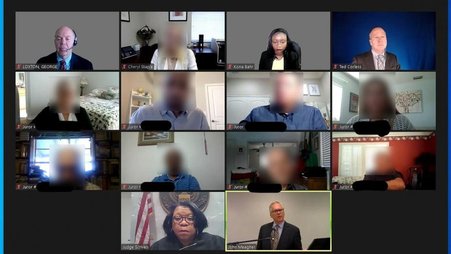Press coalition to courts: Don’t walk back pandemic-era access


CTK/Josef Horazny via AP
Our court system should be open to the public and not operate behind closed doors.
The First Amendment gives the public and the press the right to attend trials, access court documents, and report on the justice system. But far too often, judges try to evade that right by sealing records or holding secret proceedings.
We must fight back against attempts to make the court system less transparent and push to expand access. Reporting on the courts helps make our justice system fairer and guards against miscarriages of justice.

The case Sarah Palin lost against The New York Times this week was the first libel claim to even go to trial against the paper in nearly two decades. That these cases are so rare reflects a critically important precedent in American law — one established by the Times itself. And though it's a cornerstone of press freedom, it's increasingly under attack.

Court ordered settlement requires Minnesota State Patrol to stop arresting and assaulting journalists.

A state appeals court has stayed a prior restraint order in a high-profile case between the New York Times and Project Veritas. Freedom of the Press Foundation responds.

In a growing number of state legislatures across the country, journalists are facing new rules and proposed legislation that breaks with traditions of public access to legislators. These moves are a troubling development in the increasingly rocky relationship between government officials and the press that covers them, and should be rolled back and opposed wherever possible.

The fight to free PACER, the federally managed database of public court records that has sat behind a paywall since its inception, has stretched on for more than a decade now. These efforts may finally pay off in 2022 with a bill poised for the Senate floor that achieves many of the aims of the "free PACER" movement.

Today's decision to allow this prior restraint of New York Times publishing to continue — and to restrict the paper's reporters from engaging in common newsgathering activities besides — is a shameful development. It is a cornerstone of speech law in this country that any prior restraint, even a very temporary one, is constitutionally permissible only in the most extreme scenarios. As the Times noted in its briefing on the issue, the result has been that such an order has not been entered against it since the Pentagon Papers case some 50 years ago.

A trial court judge has ordered The New York Times to stop disseminating information related to Project Veritas, in a shocking act of both prior restraint and restriction on protected newsgathering activities. Dean Baquet, executive editor of the New York Times, cited the Pentagon Papers case in calling the ruling "unconstitutional" and noting that it "sets a dangerous precedent." We agree.

Legislative Branch records don’t receive the kind of public scrutiny the Freedom of Information Act brings to the Executive, but that could change thanks to a novel lawsuit over video records related to the January 6 riot at the Capitol.

The Supreme Court is set to hear arguments on the Computer Fraud and Abuse Act in a highly anticipated case, which has attracted over a dozen amicus briefs from experts around the country. Today we're highlighting some of the important speech arguments that directly affect journalists, presented in a selection of those briefs.

“Prior restraint” — or the attempt by individuals or governments to use courts to censor books or newspapers before publication — has become a tool increasingly relied upon by President Trump and his inner circle.